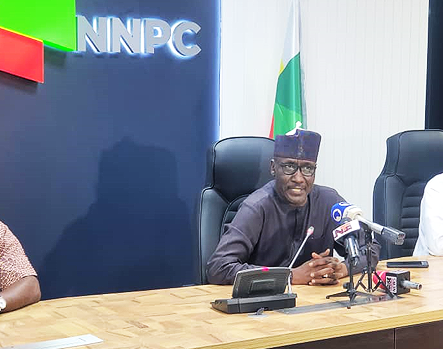🌿 Ruzu Non-Alcoholic Herbal Bitters
Ruzu Non-Alcoholic Herbal Bitters is a natural health supplement specially formulated to:
- ✅ Promote general wellness
- ✅ Detoxify the body
- ✅ Support the treatment of various ailments
Made from a powerful blend of 100% organic and medicinal herbs, Ruzu is completely alcohol-free, making it ideal for:
- 👪 All age groups
- 🌱 Health-conscious individuals
- 🌿 Anyone seeking non-alcoholic herbal remedies
Whether you're looking to boost your vitality, cleanse your system, or support healing the natural way, Ruzu Bitters offers a trusted herbal solution.
On Tuesday, the Nigerian National Petroleum Company Limited (NNPC) formally started production at the Port Harcourt petroleum refinery in Rivers Atate, which has a capacity of 60,000 barrels per day.
Speaking at a brief ceremony to commemorate the start of product loading at the refinery, Mele Kyari, the Group Chief Executive Officer of NNPC, called the start of load-out operations a huge victory for Nigeria.
He said it marks a new chapter in the nation’s economic development and energy independence.
In order to fulfill its commitment to re-stream the Port Harcourt Refining Company (PHRC), he added, the action marked the start of the plant’s processing of crude oil and the distribution of petroleum products to the market.
Premium Motor Spirit (PMS), also known as gasoline, Automotive Gas Oil (AGO), also known as diesel, and Household Kerosene (HHK), also known as kerosene, are among the petroleum goods that trucks have started loading, according to Kyari. Other product slates will also be shipped.
He also complimented President Bola Tinubu for his steadfast support and patience with the rehabilitation project and for his determination to guarantee the nation’s energy security.
Additionally, Kyari conveyed gratitude to the Board of Directors of the NNPCL and the entire workforce for their dedication and support, which culminated in the refinery’s streaming.
He praised the contractors for their excellent work in making sure the refinery was delivered in spite of all the difficulties.
He also expressed gratitude to Nigerians for their patience and for having reasonable expectations of the corporation regarding the other refineries.
“Today, we will witness loading. It is important to note that such outcomes are impossible to attain without the backing of the leadership. We are also quite certain that we would not have reached this fate if it were not for Mr. President’s assistance, tenacity, and patience.
And we must all give him our congratulations since we reached this point due to his tremendous pressure. We’re also overjoyed. And for helping us get to this point, I want to applaud my coworkers both inside and outside the refinery, as well as our contractors and even our regulators.
It’s feasible. With the correct focus, perseverance, and leadership support—all of which we currently possess—this nation and refinery have demonstrated that anything is achievable. Kyari added, “And this country is doing great under President Tinubu’s leadership.”
Mr. Farouk Ahmed, the Chief Executive of the Nigerian Midstream & Downstream Petroleum Regulatory Authority (NMDPRA), commended the NNPC on the accomplishment and promised his organization’s ongoing assistance in completing the other refineries’ restoration projects.
“I would like to confirm that the NMDPRA provided all of the regulatory support that the refinery needed, and my colleagues have been working closely with the contractor and the management of PHRC,” he added. The upgrading to modern technology is crucial, as the contractor stated.
“So, with modern technologies, this ancient plant has returned. Additionally, we worked closely with them to make sure that all regulatory standards were completed and are especially supportive. The flare is one thing we have also observed.
“As everyone can see, the flare is quite neat. Since there is no smoke, the plant is operating efficiently and in accordance with environmental standards.
In his intervention, Maire Tecnimont, Caccaviello, Luca, the project director, commended everyone for the project’s success and emphasized that the 60,000 bpd facility is currently running at full capacity.
“We performed really well. We are grateful to everyone for helping us get the facility into full production. Soon, the following phase will be to work with the same zeal and effort on the other portion of the facilities.
He continued, “And soon, despite all the challenges that lie ahead, we will have a good result on the rest of the plant.”
The goal of the refinery rehabilitation project is to bring it back to full operation and renewal through Engineering, Procurement, Construction, Installation, and Commissioning (EPCIC).
Over 16 million man-hours have been completed with no Loss Time Injury (LTI) thus far, according to the data.
















